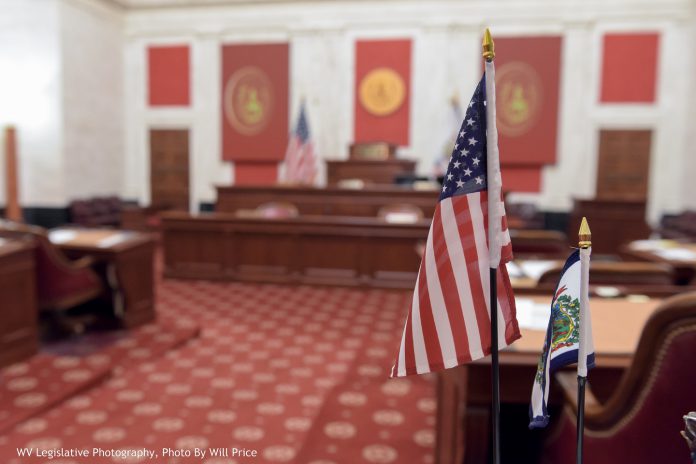As of 4 p.m., Wednesday, March 3rd, 2004, the 50th day of the 2004 Regular Session, 733 bills have been introduced in the Senate. Of those, the following bills have been passed by this body since February 25th and will go to the House of Delegates for its consideration.
Senate Bill 34 would prohibit a bank from charging a state business for fraudulent Internet transactions. Under this legislation, a bank issuing a credit card to an individual or entity licensed to do business in the state would not be allowed to charge more than $250 for each fraudulent transaction performed without a credit card. This provision would not apply to banks participating in the investigation of a fraudulent transaction.
Senate Bill 89 would require the promulgation of legislative rules to encourage the beneficial use of water treatment plant sludge, enhance resource recovery and meet recycling goals. Among other rules, restrictions of pollutant levels and criteria to protect ground and surface water would be implemented.
Senate Bill 119 would enhance the criminal penalties for obtaining money, property or services worth $1,000 or more by false pretenses from individuals over 65 years of age. Upon conviction, an individual would be subject to confinement in a state correctional facility for 2 to 20 years and/or a maximum fine of $5,000.
Senate Bill 148 would create the Tax Amnesty Program of 2004. This program would direct the Tax Commissioner to establish a two month tax amnesty period in 2004. During this designated time, a taxpayer could apply for amnesty from taxes due between January 1st, 1986 and January 1st, 2004. If the taxpayer pays the amount due, then the Commissioner would waive all penalties and 50 percent of the interest. Also, the individual would not be subject to any criminal penalties.
Senate Bill 149 relates generally to the Department of Tax and Revenue. Among other modifications, this bill would change the department’s name to the Department of Revenue and specify the duties of the Secretary of Revenue, who would be the State Budget Director. In addition, the budget section of the Department of Administration’s Finance Division would be transferred to the Department of Revenue.
Senate Bill 161 would create the Model Health Plan for Uninsurable Individuals Act. Upon passage of this legislation, the Insurance Commissioner would conduct a study to determine the feasibility of establishing a state program for administering health insurance coverage to uninsured individuals. The Commissioner would report findings, recommendations and necessary legislation to the Legislature before January 1st, 2005.
Senate Bill 229 would expand counties covered by the Route 2 and Interstate 68 Authority. If passed, this legislation would provide for coverage of Cabell, Mason and Jackson Counties beginning on July 1st, 2004. The Authority’s membership would be increased from 20 to 26, with two members from each of the newly-covered counties.
Senate Bill 230 would define “federal flood insurance” and create a special revenue fund known as the “flood insurance tax fund.” This fund would consist of all federal flood insurance premium taxes collected and any appropriations, gifts, grants or contributions
Senate Bill 52 would allow motorcycle registration plates to be fastened in vertical position. The bill also would require those obtaining a registration plate to be fastened in vertical position to pay a one-time fee of $25 to cover the additional cost and services necessary to issue the special registration plate.
Senate Bill 209 requires a review of certain state leases and purchases by the Joint Committee on Government and Finance. Under this legislation, the Secretary of Administration is required to provide the Joint Committee with copies of contracts or agreements for real property surpassing $1 million at least 30 days before the sale. Upon receipt, members of the Committee have 30 days to review the contract or agreement.
Senate Bill 268 would continue the Division of Motor Vehicles until July 1, 2006.
Senate Bill 269 would continue the Division of Purchasing within the Department of Administration until July 1, 2008.
Senate Bill 324 would continue the Division of Personnel, which was which was created in 1989 to provide leadership in personnel management for the executive operating agencies of state government, including administration of a merit system (i.e. civil service).
Senate Bill 285 would allow state-chartered banks to organize as limited liability companies if the Federal Deposit Insurance Corporation (FDIC) determines they are eligible for deposit insurance. Under this legislation, a bank would have the ability to apply to the Banking Commissioner for the certificate of authority to operate under this status. The limited liability bank would required to have a continual lifetime, centralized management, limited liability and free transferability of interest.
Senate Bill 316 would provide procedures for determining the daily costs for certain inmates by extracting certain provisions from the Regional Jail and Correctional Facility Authority’s rule relating to these expenses. This bill would require the Authority to adopt and approve a schedule of anticipated expenditures for each regional jail. If costs exceed the approved schedule by more than 10 percent in a line item, then the Executive Director would add a temporary surcharge to the daily cost of each inmate. This surcharge would cover the actual expenditures.
Senate Bill 447 relates to the powers and duties of municipal courts to collect certain moneys. This bill would create a manner for recovering outstanding fines and fees from an individual’s failure to appear in municipal courts.
Senate Bill 480 would exempt nonprofit licensed nursing homes from registration under solicitation of the Charitable Funds Act. These nursing homes would not be required to file an annual registration statement with the Secretary State.
Senate Bill 663 would prohibit nursing homes, residential board, care homes and assisted living facilities from soliciting or coercing residents into giving them money or other assets.

